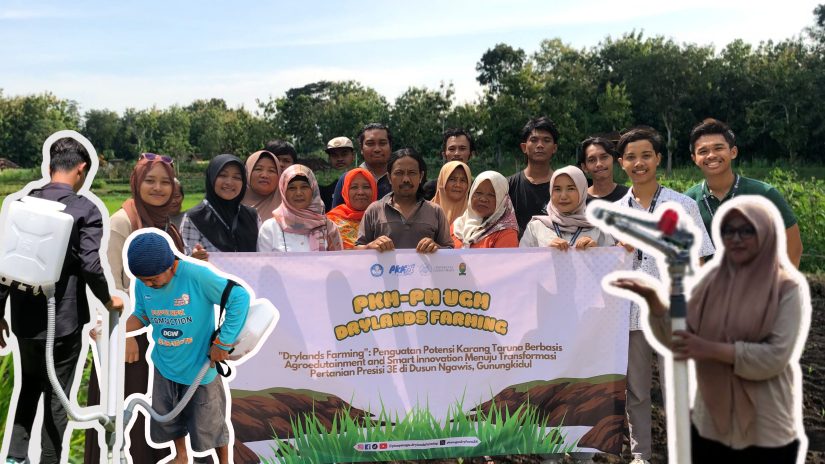
Gunungkidul is a region supplying food needs such as rice, legumes, corn, and chili in the Special Region of Yogyakarta. Currently, food needs are very crucial. This is because the domestic food supply has not yet met consumer demand. Moreover, according to the National Food Agency’s Food Balance Report, all of Indonesia’s strategic food needs cannot be fulfilled with domestic production, resulting in the necessity to import several primary food items.
Based on observations with the chairman of Karang Taruna Harapan Jaya in Ngawis 2, several agricultural problems were identified, including pests, declining land productivity, drought, simple fertilization methods, and outdated agricultural systems. Addressing these issues is essential since Ngawis 2 has natural and human resources with potential for further development.
“Currently, the issues we are facing in agriculture include pests, agricultural management, drought, and traditional farming systems. We hope for external support to transform these aspects and create additional business opportunities for us,” explained Sutar, a member of Karang Taruna Harapan Jaya, on Monday (15/7).
In response to these challenges, five students from Universitas Gadjah Mada, in collaboration with Karang Taruna Harapan Jaya, developed a transformation through the Student Creativity Program in Community Service (PKM-PM) titled “Drylands Farming: Strengthening the Potential of Youth Organizations Based on Agroedutainment and Smart Innovation Towards 3E Precision Agriculture Transformation in Ngawis, Gunungkidul.”
The team, consisting of Faris Ariwibowo (Faculty of Animal Science) as team leader, Ana Nur Fauziah (Faculty of Agricultural Technology), Sofi Awaliyatul Mukaromah (Faculty of Animal Science), Vania Zerlin Azaria (Faculty of Agriculture), and Adry Aqwam Thoriq (Faculty of Animal Science), was supervised by Dr. Ir. Siti Andarwati, S.Pt., M.P., IPM., ASEAN Eng. (Lecturer, Faculty of Animal Science, Department of Socio-Economic Animal Science).
Faris hopes that the agricultural system proposed by the DryFarm Community Service Team can bring change to Ngawis 2.
“The agricultural system in Ngawis 2 through the empowerment of youth organizations based on agroedutainment and smart innovation as agents of change is expected to bring about changes focusing on sustainable development goals (SDGs),” he said.
The presence of smart innovation through the creation of smart bag fertinnovation and sprinkler applications is expected to facilitate the community in developing agricultural potential more effectively, efficiently, and economically. Additionally, the sustainability of this program includes establishing a smart bag fertinnovation business and selling independent compost fertilizers, which can serve as additional businesses for the community partners.
Meanwhile, the team supervisor, Dr. Ir. Siti Andarwati, S.Pt., M.P., IPM., ASEAN Eng., explained that the priority scale involves strengthening the potential of youth organizations based on agroedutainment and smart innovation. Agroedutainment activities include training programs in land processing, planting, soil condition checking, fertilization methods, irrigation, making independent compost fertilizers, practical innovation creation, and harvesting. According to 2021 BPS data, Karangmojo Sub-district has about 2,021 hectares of productive land, including land in Ngawis 2.
“The drylands farming program consists of agroedutainment activities to strengthen the potential of youth organizations and foster an entrepreneurial spirit to improve the living standards of the partner community,” said Siti.
The involvement of youth organization members, particularly Karang Taruna Harapan Jaya, who are of productive age, will create excellent human resources, enhance economic aspects, and introduce appropriate innovations as an effort to transition towards modern agriculture. Achieving the 3E precision agriculture system (efficient, effective, and economical) is expected to facilitate the partner community in developing better agricultural potential.
Source and photo: DryFarm Community Service Team
Editor: Satria
Translator: Prisilia Putri
